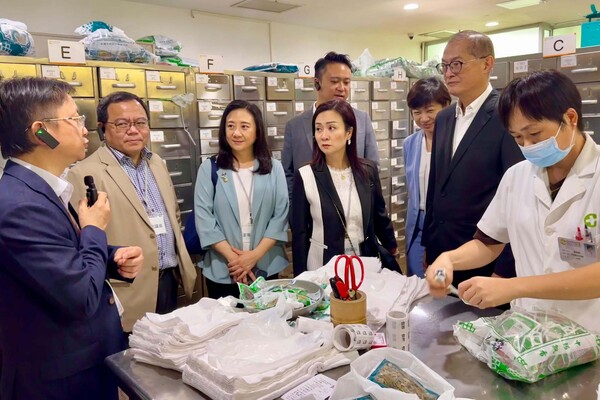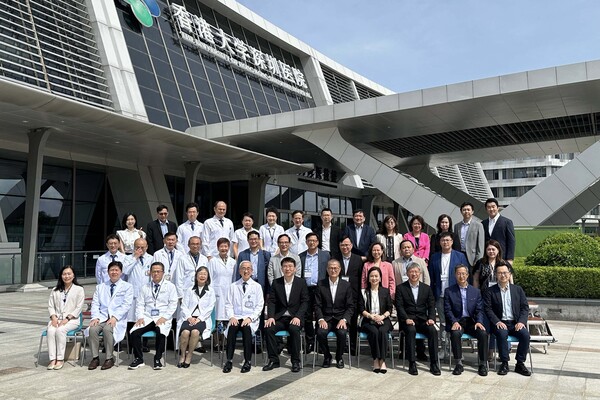Health chief tours hospitals
Secretary for Health Prof Lo Chung-mau today led a delegation on visits to two Tier III Class A hospitals in the Greater Bay Area to learn about the latest services, facilities and medical standards offered in the Mainland by such hospitals and to discuss ways of boosting cross-boundary medical collaboration.
The delegation went to the ZhongShan Chenxinghai Hospital of Integrated Traditional Chinese & Western Medicine in the morning.
The hospital is the first Tier III Class A hospital of integrated traditional Chinese and western medicine to be co-developed by Guangdong and Hong Kong. In 2021, it was included in the first batch of healthcare institutions in the bay area that are allowed to use Hong Kong-registered drugs and medical devices used in Hong Kong public hospitals. It was also included in the Elderly Health Care Voucher Greater Bay Area Pilot Scheme this February.
The delegation toured multiple departments at the hospital, including its Health Management Center, Integrated Endoscopy Center, Health Construction Administration & Rehabilitation Department, International Medical Center, Stomatology Department and 3D Printing Application Center. Representatives of the hospital introduced the healthcare and support services available to Hong Kong and Macau citizens.
In the afternoon, the delegation headed to Shenzhen to visit the University of Hong Kong-Shenzhen Hospital. Operating under a model of management and co-operation between Hong Kong and Shenzhen, the hospital is another integrated Tier III Class A hospital and has long been at the forefront of cross-boundary medical collaboration. In 2015, it became the very first bay area Mainland medical institution where Elderly Health Care Vouchers can be used to pay for designated out-patient services.
In 2021, it became the only healthcare institution in the bay area to use Hong Kong-registered drugs and medical devices used in Hong Kong public hospitals on a trial basis, and then one of the first batch of institutions allowed to use such drugs and devices on a regularised basis.
After touring departments such as the out-patient pharmacy, the Department of Family Medicine and the Department of Dental Surgery in the hospital, the delegation was briefed on the hospital's arrangements in relation to providing cross-boundary medical services.
During the visit, Health Bureau personnel introduced two new functions on the eHealth mobile application, namely “Cross-boundary Health Record” and “Personal Folder”. These will be launched at the hospital on a trial basis on July 15 to facilitate cross-boundary medical collaboration.
Prof Lo said that with travel to and from the Mainland increasing, demand from Hong Kong citizens for healthcare services in the Mainland has been on the rise, with greater emphasis being put on Chinese medicine for disease prevention and treatment.
He noted that today's visits not only enhanced the delegation's understanding of Tier III Class A hospitals in the Mainland, but also increased the two institutions' awareness of the medical needs of Hong Kong citizens.
He emphasised that the Hong Kong Special Administrative Region Government remains committed to fulfilling its important role of safeguarding the well-being of Hong Kong citizens by continuing to provide them with quality healthcare services and will never shift its responsibility for their well-being to the Mainland healthcare system.
He added that in formulating cross-boundary healthcare measures, the Hong Kong SAR Government will support the healthcare needs of Hong Kong citizens who choose to pursue opportunities and live in the Mainland, while also taking into account the potential impact of the measures on the social resources and livelihoods of citizens in the Mainland.

